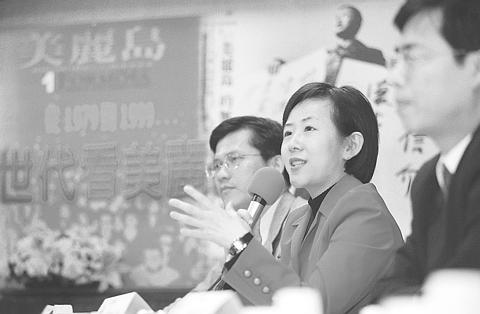A younger generation of Taiwan's political opposition traded impressions over the 1979 Kaohsiung Incident (
"Without the Kaoshiung Incident (
To consolidate Taiwan's democratic system, including the party politics that the DPP has been striving for, is the new task for the next generation, they said.

PHOTO: GEORGE TSORNG, TAIPEI TIMES
Seven DPP scholars and politicians, most of whom were in their teens during the incident, and had later joined the student movements in the 80s, participated in a symposium on the impact of the incident.
For most participants, the incident was their beginning of skepticism regarding politics and propaganda at that time.
"What really shocked me was the public trial itself of the defendants (known as the `Kaohsiung Eight', who were tried for inciting the so-called `riot'). Everyone was so self-confident and righteous in the trial, which really made me think of the situation of our country," said Lai Ching-ling (賴勁麟), a DPP legislator who was a senior high school sophomore at the time.
"At that time I was very much influenced by anti-Taiwan independence propaganda, and so-called `anti-violence' tones in media reports. But in later years, I began to read different `tang-wai' [黨外, or literally `outside the party'] magazines, and I was often moved to tears by the words of Shi Ming-te (施明德) when he was jailed," said Lin Chia-lung (林佳龍), a professor at National Chung-cheng University.
Lai said the incident was the reason he chose to major in politics and became devoted to the DPP. Lin also became a politics major three years after the incident.
For DPP legislative caucus leader Chen Chi-mai (
The incident had also created role models for the future politician that time, according to DPP legislator Wang Shue-feng (
"She was one of only two women, and was also a law school graduate," Wang said.
The participants at yesterday's discussion, all in their 30s, agreed that the incident had opened a space for independent thinking, and had fostered social and political student movements in the 80s that helped the establishment of the DPP itself in 1986.
Wang said the incident ultimately helped Taiwan form a democratic political system, and that what is needed now is to improve the quality of Taiwan's politics.
"Black-gold politics have made the twenty-something generation disappointed with politics. We feel that we should bear a more heavy responsibility, because current politics do not draw a clear-cut distinction between black and white, or between good people and bad people," said Wang.

MAKING WAVES: China’s maritime militia could become a nontraditional threat in war, clogging up shipping lanes to prevent US or Japanese intervention, a report said About 1,900 Chinese ships flying flags of convenience and fishing vessels that participated in China’s military exercises around Taiwan last month and in January last year have been listed for monitoring, Coast Guard Administration (CGA) Deputy Director-General Hsieh Ching-chin (謝慶欽) said yesterday. Following amendments to the Commercial Port Act (商港法) and the Law of Ships (船舶法) last month, the CGA can designate possible berthing areas or deny ports of call for vessels suspected of loitering around areas where undersea cables can be accessed, Oceans Affairs Council Minister Kuan Bi-ling (管碧玲) said. The list of suspected ships, originally 300, had risen to about

DAREDEVIL: Honnold said it had always been a dream of his to climb Taipei 101, while a Netflix producer said the skyscraper was ‘a real icon of this country’ US climber Alex Honnold yesterday took on Taiwan’s tallest building, becoming the first person to scale Taipei 101 without a rope, harness or safety net. Hundreds of spectators gathered at the base of the 101-story skyscraper to watch Honnold, 40, embark on his daredevil feat, which was also broadcast live on Netflix. Dressed in a red T-shirt and yellow custom-made climbing shoes, Honnold swiftly moved up the southeast face of the glass and steel building. At one point, he stepped onto a platform midway up to wave down at fans and onlookers who were taking photos. People watching from inside

Japan’s strategic alliance with the US would collapse if Tokyo were to turn away from a conflict in Taiwan, Japanese Prime Minister Sanae Takaichi said yesterday, but distanced herself from previous comments that suggested a possible military response in such an event. Takaichi expressed her latest views on a nationally broadcast TV program late on Monday, where an opposition party leader criticized her for igniting tensions with China with the earlier remarks. Ties between Japan and China have sunk to the worst level in years after Takaichi said in November that a hypothetical Chinese attack on Taiwan could bring about a Japanese

The WHO ignored early COVID-19 warnings from Taiwan, US Deputy Secretary of Health and Human Services Jim O’Neill said on Friday, as part of justification for Washington withdrawing from the global health body. US Secretary of State Marco Rubio on Thursday said that the US was pulling out of the UN agency, as it failed to fulfill its responsibilities during the COVID-19 pandemic. The WHO “ignored early COVID warnings from Taiwan in 2019 by pretending Taiwan did not exist, O’Neill wrote on X on Friday, Taiwan time. “It ignored rigorous science and promoted lockdowns.” The US will “continue international coordination on infectious